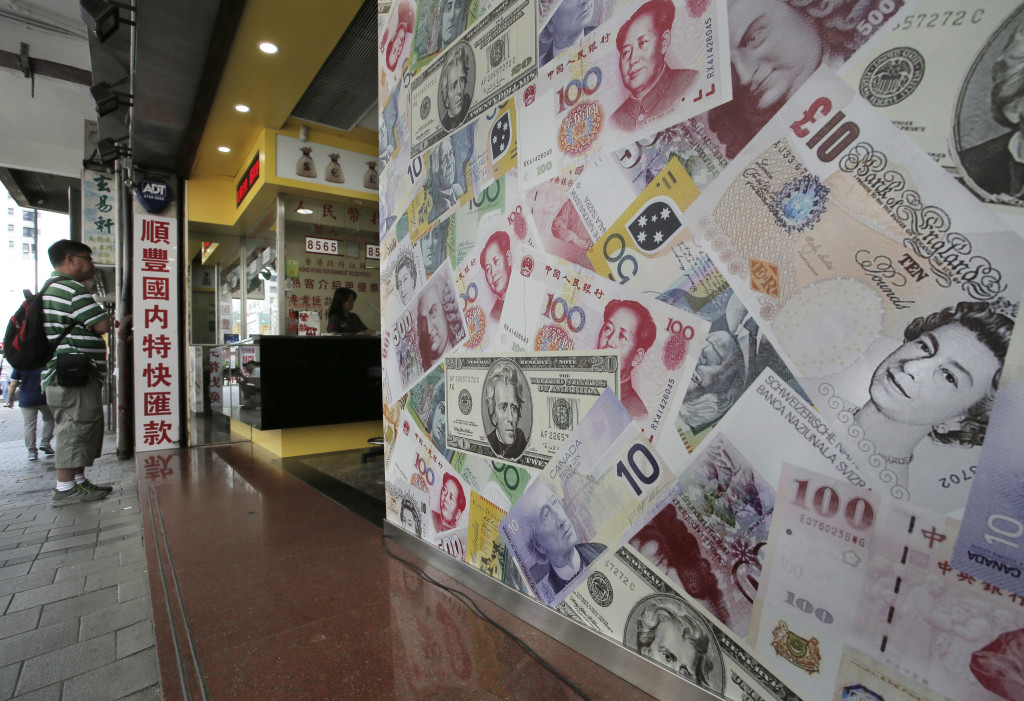
A man stands outside a money exchange shop decorated with different countries bank notes in Hong Kong, Monday, June 27, 2016. Asian stock markets resumed their losses Tuesday morning, extending another sharp sell-off in Europe and New York that was fueled by Britain’s shock decision to tear itself away from the EU. AP
HONG KONG, China — Asian stock markets resumed their losses Tuesday morning, extending another sharp sell-off in Europe and New York that was fueled by Britain’s shock decision to tear itself away from the EU.
Regional markets enjoyed a surprise bounce Monday after Friday’s mauling, but uncertainty over the vote — which many fear could precipitate the end of the United Kingdom and even the European Union — led to renewed selling.
However, the pound saw a much-needed uptick after plumbing new three-decade lows in New York, although there was a warning it could go even lower against the dollar as the crisis drags on.
A lack of haste among Britain’s leadership is adding to the sense of drift in the country, with Prime Minister David Cameron saying he will stand down in the autumn and hand the responsibility for extricating the country from the EU to his — as yet unknown — successor.
While Cameron does not want to trigger the process to leave before he steps down, he is facing pressure from other EU leaders to hurry the process up ahead of a crucial Brussels summit Tuesday.
Britain’s top-notch Triple-A rating was cut by two agencies Monday.
“Equity markets hate this sort of uncertainty,” Grant Williamson, an investment adviser at New Zealand brokerage Hamilton Hindin Greene, told Bloomberg News.
“This is unchartered territory as to how it all plays out with the exit negotiations. It’s going to cause disruption to world trade and it will take quite some time for the UK to realign their economy.”
Tokyo ended the morning down 0.3 percent, although it pared its initial two percent losses on speculation Japan’s leaders could introduce stimulus to mitigate the impact of the Brexit crisis.
Hong Kong retreated 1.2 percent, Shanghai dipped 0.2 percent and Sydney fell 1.3 percent. Seoul was flat while Wellington eased 0.3 percent.
The retreat tracked similar losses in New York, where the three main indexes lost between 1.5 and 2.4 percent.
A painful $974.2 billion was scythed off the S&P 500 in two days, the third worst back-to-back stretch in history, according to S&P Dow Jones Indices.
Asia damage ‘limited’
Earlier Frankfurt and Paris lost three percent each and London gave up 2.6 percent.
In Asian forex trade the pound bought $1.3308, up from $1.3228 late in New York and much stronger than the $1.3121 hit earlier Monday, which was its lowest level since September 1985.
But Japanese banking giant Nomura warned it could fall to $1.25 owing to worries about Britain’s economic future.
Standard & Poor’s and Fitch each cut Britain’s top sovereign credit rating, making it more expensive to borrow cash in international markets.
Apart from the feared blow to the financial sector, S&P warned there were also risks to Britain’s “constitutional and economic integrity” due to the possibility of a future referendum on Scottish independence.
Despite the losses in Asia, S&P Global Ratings credit analyst Terry Chan said he saw limited long-term damage to the region.
“Brexit’s market impact is likely to be significant in the near term, particularly in terms of stock market and currency volatility,” he said.
“The medium-term impact on Asia-Pacific markets, however, is likely to be limited as investors make decisions based more on economic and financial fundamentals rather than just sentiment.
“If market volatility were to spike and prolong, we believe Asia-Pacific regulators are likely to take action, including extending short-term liquidity.”
Oil prices climbed on bargain-buying, having lost around 10 percent since hitting 2016 highs above $52 earlier in the month.
West Texas Intermediate was up 0.9 percent at $46.75 and Brent added one percent to $47.63.
RELATED VIDEOS